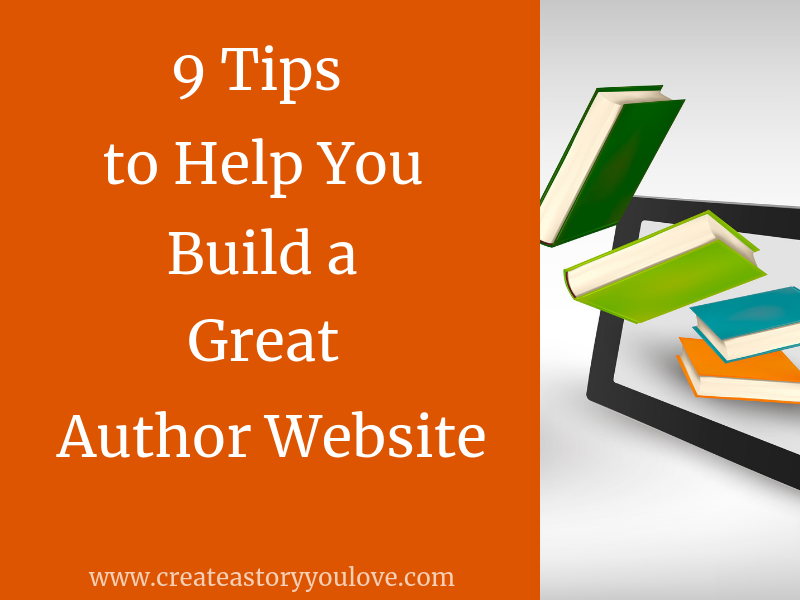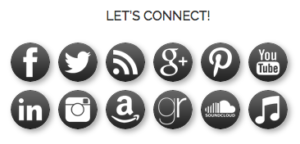As writers, it’s important to have a place online where readers can find you.
Your website is your “home” on the Internet.
Building your author website so it attracts and engages your readers is super important.
Here’s why:
- It’s one of the big ways you attract your target audience with blogposts, podcasts, videos, etc., that trains, inspires or entertains. And as they get to know, like and trust you, hopefully they will take the next step to join your email list and buy books/products from you.
- Your author website paints a picture of your author brand. It gives a snapshot of your personality, what you love, what’s important to you… and shows your expertise. This is how people see what you’re all about in the online space.
- It’s the space a agent or publisher will look to find you – if they are interested in finding more about you.
- Your author website is basically your home on the internet. This is where you add links to your books, products and services so people can find and buy what they’re interested in – in one place.
- It’s also the powerhouse that runs your business in the online space. It really does help you make a living as an Author.
Read on to find the 9 important elements you should include in your author website to attract your unique readers…

9 Tips and Important Elements for a Great Author Website
As storytellers and authors, our needs change as we write more books and as our audience grows.
For instance, if you have one book you needs might be simple – basic information about the book and your author and purchase links. However, as you write and publish more books, it’s really a good idea to create a webpage for each book and to give your readers more details about you as the author.
Also, if your goal is to establish and grow your business from your website, you’ll need content(blogposts, podcasts, videos,etc.), that will attract the right audience back to your website. If you need more help to set up your author website, watch a short video tutorial here.
I hope the 9 tips below, help you to build, grow and optimize your website – if you’re just starting out or if you’re farther along the journey.
1. Your About Page
Your page that has a description about you the author, is actually one of the most looked at pages on any website. People connect with other people, and they love to know what makes you tick 😉
Sure readers want to know about your books, but they are really interested in you personally. So make it interesting – witty, self-deprecating humour, cute sayings – whatever makes you unique… let it shine! People are looking to see if they connect and resonate with you as a person and whether your website is a good fit for them.
 So ask yourself if you are giving readers what they are looking for:
So ask yourself if you are giving readers what they are looking for:
A picture that shows your face, is a great place to start. A clear and good picture of you, will help readers to connect with who you are. People connect with people, so add a great picture of you. If you’re worried about how you look, invest in some professional photos, and then you can use this picture in the back of your books, on your website as well as any marketing you do.
If you are writing under a pen name and you are wanting to protect your identity, you could always use a picture that has meaning to you – instead of a photo of your face. It’s really important that you are personal and that readers feel like they have been invited into your life in some sort of way. Sharing personal stories and/or pictures goes a long way to connecting with your audience.
2. Book Covers and Book Blurbs
As an author, you are selling books. So it’s important that your book covers are somewhere where readers can find them quickly – so it catches their eye and compels them to reader further.
These book covers should be professionally designed that really resonate with your genre and the audience of readers that you’re writing for.
Also, you need a great book blurb – sales description – on the same page to captivate your readers so they want to read more. It’s helpful if you begin with a headline – written in bold lettering.
For nonfiction, include details from your table of contents – and the solution you are offering – so readers understand what answer will be solved for them when they buy your book. For fiction, begin your book blurb with a opening hook that creates curiosity and compels them to want to read more.
3. Add Buy Links to wherever your book(s) are sold
It’s important to make it as simple and easy as possible for readers to buy your book. Preferably, with just one click.
It’s great if you can use the icons per store – because that’s what readers will recognize and they will naturally gravitate to the digital retailer where they normally buy their books.
4. Have a Way for People to Contact You
Your readers might want to send you a message or maybe a blogger, podcaster or journalist wants to interview you. They need a simple way to send you a message. One of the best ways I’ve found, is to have a drop-down menu(like I have on this blog) that says “Contact.” It’s a WordPress plugin that I added called Contact Form 7.
5. An Easy Way for Readers to Sign Up to Your Email List
It’s critical as authors, to build and grow your own list of readers. This is a way of thinking long-term so you can always let readers know when your next book is available.
I mention in Write and Publish Your First Book, how important it is that as authors we don’t depend only on digital retailers only(Amazon, Kobo, etc.,) to sell our books. We never know when something could change. To ensure that you’ll still be able to get your books to readers – and still serve your readers independent of retailers – you need an email list.
I’ve discovered that if you give something of value away for free – it attracts readers to your email list. I use a short Western Historical Romance, A Most Unsuitable Husband for my fiction list and for my nonfiction blog to help writers, I created this free email mini-course, The Storyteller’s Roadmap .
Also, you need to use a mail service provider that complies with anti-spam laws like MailerLite(which I use) or MailChimp. That way when your list grows into the hundreds or thousands it’ll make it easy to write emails and send updates and free books/PDF’s to your readers.
If you want more help on how to grow your email list, I recommend Nick Stephenson’s Free Reader Magnet ebook here.
6. Add Social Media Buttons to your Website
![]() There are some 1 click sharing plugins that you can use to share your content and your books with other readers.
There are some 1 click sharing plugins that you can use to share your content and your books with other readers.
You can put them on a noticeable spot on your website.
That way people can easily share your content.
I use the SumoMe plugin to make it easy for readers to share posts and![]() pages on my website. I also use a plugin called iiRe Social Icons so people know where they can connect with me on different social media platforms.
pages on my website. I also use a plugin called iiRe Social Icons so people know where they can connect with me on different social media platforms.
I’ve learned that it’s important to have your social media buttons somewhere on your website where readers can quickly find them. Probably most people who browse different blogs, are looking for a quick way to share the post or page if they find it interesting. I’m the same way. So, make it simple and easy for your audience to share your posts.
7. Add Testimonials and/or Reviews of your Books/Courses
When someone reviews your book, it’s social proof, and those reviews are often the tipping point that attracts readers to buy your book.
On your author website, it’s helpful to use testimonials or reviews. You can also add pictures and URL’s of the people who wrote the testimonials which helps to build trust.
It’s helpful if you ask people who love reading your genre of book or for nonfiction, are in a similar niche as you, for reviews.
8. Paint a Picture of Your Author Brand to Your Target Audience
As readers show up on your website, they will immediately get an idea of whether they connect with who you are… or not. This is normal. Your goal is to create your website to reach your target audience, not just anyone.
Some people will be curious and read your about page, look at your books and maybe a blogpost… and hopefully sign-up to your email list.
The real goal is to attract those readers who resonate with your brand to stick around to hear more from you!
The images and words you use are subtle but important building blocks in a reader’s impression of who you are.
How you build your website – how it looks – will show a potential audience whether you’re a serious(professional) writer, or if you’re a hobbyist.
If you’re just starting out as a first-time author – if you’re on a tight budget – you can use a free WordPress site(wordpress.com).
However, if you’re serious about building a long term career as an author, it’s important to invest in your website as the central core of your business. So at some point it’s important to set up and build a self-hosted website – that you have control over.
It’s true that there is a little bit of a learning curve – as with most new things – but you can do it. And it will definitely improve your first impression and reach of readers.
Also important is to double check that your website theme is a responsive design. This is super important because of the increase of readers using mobile digital devices(smartphones, tablets, etc.) to access the internet. Since there’s an upsurge in people using mobile devices, it becomes even more critical that people can easily access your website online.
9. Blogging on your Website
Should you blog as an author or not? That’s a really good question, which only you can answer.
The simple answer, is it depends on what your goals are with your website, your books and your overall time.
I’ve seen indie authors who are earning well into 7 figures with their books – like Barbara Freethy – who have a website, but don’t blog at all.
However, if you love the idea of sharing updates with your readers and touching base with them on a regular basis, then blogging can be such a great idea.
If you have a business that draws people to topics and back-end products(like courses) and services(like coaching), it’s definitely worth it to blog on a regular basis. Content marketing(blogging, podcasting, and videos), are excellent ways to get more traffic to your website.
My website, brings me income from my books, online course and from affiliate income. But I didn’t start out that way. I started out struggling and confused about what to do with my own website and what to write on a blog. So I started out with a free Blogger website, and then moved to my own self-hosted WordPress website. Along the way – and after 3 failed websites – I have learned so much about what works for me and what attracts new readers.
I’ve come to love blogging and podcasting and I love sharing what I’m learning with new writers and indie authors. So there are many rewards both financially and creatively as you grow your website.
My biggest discovery is that you can develop your voice as a writer and grow a community of readers around your website.
This has been so great! It’s encouraging when readers tell me that a blogpost has really helped them in some way. It’s inspiring…. and if you choose to blog, you’ll soon experience some similar responses from your audience.
So, if you choose to blog, share your unique and quirky self, and you’ll attract readers to you. If you choose not to blog, you’ll still need a website where people can sign-up for your newsletter. This is where your fans can find you… and is one of the most important ways to connect with them.
If you are ready to start growing your readership and career as an author, then I recommend starting with your own self-hosted WordPress website.
It only takes a few minutes to get it set up. In this short video tutorial, I take you through step-by-step with screenshots and text links as well.
Bluehost is what I recommend as a starting place to host your website… they have amazing customer service and are one of the least expensive options. Here’s a list of tools I use and love here.
No matter where you are on the Storyteller’s path, it’s helpful to reflect on how your website will attract your target readers to you and your books. This will attract more readers to you and your books and grow your author business 🙂
Have you setup your author website? Please share in the comments below, I’d love to hear from you!
